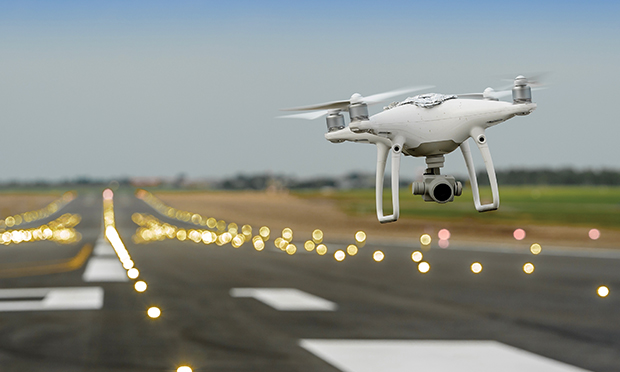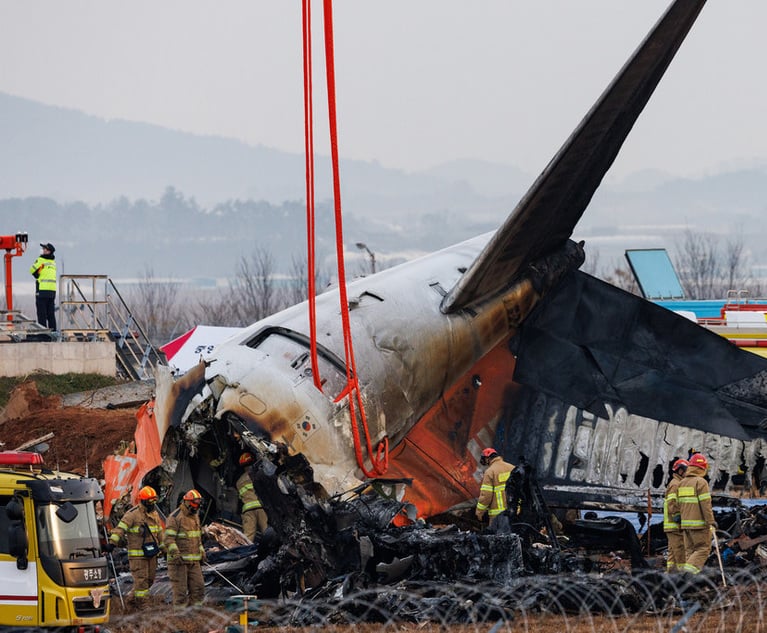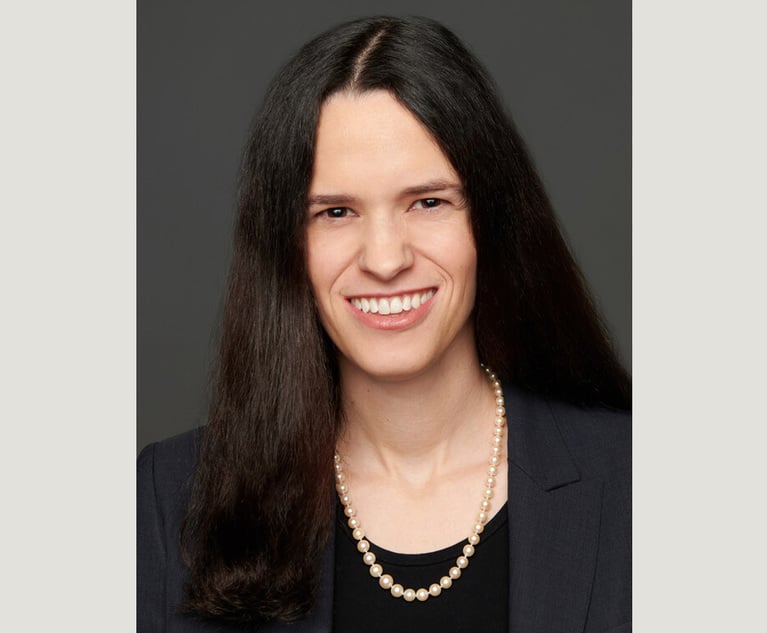 In the last several months, there were three incidents where drones operating in the vicinity of airports disrupted operations. No one was injured, but tens of thousands of passengers were affected. (Photo: Shutterstock)
In the last several months, there were three incidents where drones operating in the vicinity of airports disrupted operations. No one was injured, but tens of thousands of passengers were affected. (Photo: Shutterstock)
Within the last several months, there has been substantial media coverage of drones being operated in the area surrounding three major airports, Gatwick, Heathrow and Newark. Fortunately, there were no collisions with passenger aircraft. However, all three incidents caused significant disruption to airport operations and the plans of tens of thousands of passengers.
The media coverage about these incidents has focused on the inadequacy of airport drone security measures, the risks posed by increased numbers of drones and the possibility of a serious accident involving a passenger aircraft. While the focus on these topics is certainly understandable, there has been little attention paid to who could be held liable if there was an accident, what the standards for liability would be and whether there would be insurance coverage for the damages that might be claimed.
Determining liability
More than 25 years of handling aviation accident cases makes several things clear to me. First, if there was an accident, there would be litigation. Second, the more uncertainty there is about who is liable and what the standards for liability are, the more litigation there will be. Third, there will be calls from commentators and self-described “experts” for government regulators “to do something.” Couple the foregoing with the likelihood of worldwide media coverage and the result will likely be legal rulings and government regulations that do more harm than good to a fledgling industry that has the potential to provide many transformative benefits.
I do not propose to have the definitive answers to what the standards for liability or insurance coverage should be. However, I have given much thought to what the questions are that should help provide the answers to these questions. In that regard, the first question is: Should there be uniform rules for drone operations? If so, how should uniform rules be established? If not, should operating rules vary from city to city, state to state and country to country?
Should Heathrow, Gatwick, Newark and airports around the world have anti-drone security measures? If so, what type of system would be considered adequate?
Should a parent who owns, registers and insures a drone be liable and insured for an accident caused by that drone if it was used without the parent's knowledge or permission?
Is a drone manufacturer or drone use app developer liable for erratic drone operation or failure to warn about operations in certain types of meteorological conditions?
Finding answers to future claims
I cannot provide definitive answers to these questions, but I can offer some guidance that I have gleaned from my many years of experience handling aviation accident claims and litigating the issue of standards in a wide variety of matters.
My long-held position is that standards for aviation-related operations must be generally uniform. In the U.S., that means that the FAA is the source of all safety-related and operational standards. This position has gradually been accepted by the courts and endorsed by the FAA. In fact, the FAA has cited to the foregoing and advised state and local jurisdictions that they lack authority to regulate airspace and flight operations. A federal court in Boston has also adopted this rationale to preclude the City of Newton from infringing upon the federal regulatory scheme.
In the area of security, the federal court supervising all the 9/11 litigation held that federal security standards preempt common law based on “reasonable care” standards and establish a complete defense for airlines and airports complying with same. While that holding certainly establishes some useful precedent, is it really applicable when the FAA sends a notice to airports — as it did in July last year — telling them that they should hold off purchasing anti-drone security until the technology is better developed?
In all likelihood, there is enough information available to start providing answers to the liability questions listed earlier. However, merely giving thought to these issues is not enough. That is because the law addressing these issues will most likely develop in random cases that will likely involve seemingly minor incidents. It is important that the judges considering these claims (and the media covering them) understand the larger context in which these incidents should be considered. In that regard, it will most likely be drone manufacturers, operators and their insurers who will be in the best position to educate the court and the media about these concerns.
Without the proper context, the law will develop in a way that fails to consider the larger operational and liability issues that are essential to the continued growth of a truly transformative technology. It is time to give these questions more thought and come up with some sensible answers and a construct that provides far more certainty than presently exists. Compared to the technological issues that drones present, finding answers to these legal liability issues should be comparatively “easy.”
Jeff Ellis ([email protected]) is an aviation partner at Clyde &Co. He has represented the interests of United Airlines in the litigation arising from the 9/11 terrorist attacks, Delta Air Lines in the Swissair/Delta Flight 111 crash, Continental Airlines in the Air France Concorde crash, Delta/Northwest in the litigation arising out of the Underwear Bomber incident and AUVSI and CTA as amici in Singer v Newton.
Related:
This content has been archived. It is available through our partners, LexisNexis® and Bloomberg Law.
To view this content, please continue to their sites.
Not a Lexis Subscriber?
Subscribe Now
Not a Bloomberg Law Subscriber?
Subscribe Now
NOT FOR REPRINT
© 2025 ALM Global, LLC, All Rights Reserved. Request academic re-use from www.copyright.com. All other uses, submit a request to [email protected]. For more information visit Asset & Logo Licensing.
You Might Like
View All
Lawsuit alleges racial and gender discrimination led to an Air Force contractor's death at California airfield
7 minute read
Aviation Attorney and Pilot Analyzes Jeju Air Crash, Potential Litigation Issues

In-House Moves of the Month: Boeing Loses Another Lawyer, HubSpot Legal Chief Out After 2 Years
5 minute read
SpaceX Sues California Coastal Commission, Alleging Political Bias Against CEO Elon Musk
Trending Stories
- 1We the People?
- 2New York-Based Skadden Team Joins White & Case Group in Mexico City for Citigroup Demerger
- 3No Two Wildfires Alike: Lawyers Take Different Legal Strategies in California
- 4Poop-Themed Dog Toy OK as Parody, but Still Tarnished Jack Daniel’s Brand, Court Says
- 5Meet the New President of NY's Association of Trial Court Jurists
Who Got The Work
J. Brugh Lower of Gibbons has entered an appearance for industrial equipment supplier Devco Corporation in a pending trademark infringement lawsuit. The suit, accusing the defendant of selling knock-off Graco products, was filed Dec. 18 in New Jersey District Court by Rivkin Radler on behalf of Graco Inc. and Graco Minnesota. The case, assigned to U.S. District Judge Zahid N. Quraishi, is 3:24-cv-11294, Graco Inc. et al v. Devco Corporation.
Who Got The Work
Rebecca Maller-Stein and Kent A. Yalowitz of Arnold & Porter Kaye Scholer have entered their appearances for Hanaco Venture Capital and its executives, Lior Prosor and David Frankel, in a pending securities lawsuit. The action, filed on Dec. 24 in New York Southern District Court by Zell, Aron & Co. on behalf of Goldeneye Advisors, accuses the defendants of negligently and fraudulently managing the plaintiff's $1 million investment. The case, assigned to U.S. District Judge Vernon S. Broderick, is 1:24-cv-09918, Goldeneye Advisors, LLC v. Hanaco Venture Capital, Ltd. et al.
Who Got The Work
Attorneys from A&O Shearman has stepped in as defense counsel for Toronto-Dominion Bank and other defendants in a pending securities class action. The suit, filed Dec. 11 in New York Southern District Court by Bleichmar Fonti & Auld, accuses the defendants of concealing the bank's 'pervasive' deficiencies in regards to its compliance with the Bank Secrecy Act and the quality of its anti-money laundering controls. The case, assigned to U.S. District Judge Arun Subramanian, is 1:24-cv-09445, Gonzalez v. The Toronto-Dominion Bank et al.
Who Got The Work
Crown Castle International, a Pennsylvania company providing shared communications infrastructure, has turned to Luke D. Wolf of Gordon Rees Scully Mansukhani to fend off a pending breach-of-contract lawsuit. The court action, filed Nov. 25 in Michigan Eastern District Court by Hooper Hathaway PC on behalf of The Town Residences LLC, accuses Crown Castle of failing to transfer approximately $30,000 in utility payments from T-Mobile in breach of a roof-top lease and assignment agreement. The case, assigned to U.S. District Judge Susan K. Declercq, is 2:24-cv-13131, The Town Residences LLC v. T-Mobile US, Inc. et al.
Who Got The Work
Wilfred P. Coronato and Daniel M. Schwartz of McCarter & English have stepped in as defense counsel to Electrolux Home Products Inc. in a pending product liability lawsuit. The court action, filed Nov. 26 in New York Eastern District Court by Poulos Lopiccolo PC and Nagel Rice LLP on behalf of David Stern, alleges that the defendant's refrigerators’ drawers and shelving repeatedly break and fall apart within months after purchase. The case, assigned to U.S. District Judge Joan M. Azrack, is 2:24-cv-08204, Stern v. Electrolux Home Products, Inc.
Featured Firms
Law Offices of Gary Martin Hays & Associates, P.C.
(470) 294-1674
Law Offices of Mark E. Salomone
(857) 444-6468
Smith & Hassler
(713) 739-1250






